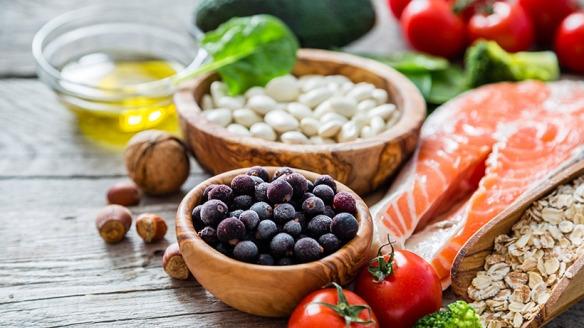Anti-Inflammatory Foods May Help You Age Well

Anti-inflammatory diets have become all the rage in recent years. New research has found that a food group previously left out of these diets – dairy – may help fight inflammation and promote healthy aging.
What should you know about the effects of inflammation and how can you incorporate more anti-inflammatory foods, including certain dairy products, into your diet?
Problems with the standard American diet
The standard American diet – known as SAD – includes a variety of foods that taste great but don’t do great things for our health. Harvard University notes that to reduce inflammation, more doctors are beginning to look to kitchen cabinets rather than medicine cabinets. Unfortunately, many favorite foods may be off the menu when it comes to inflammation.
Many common foods are full of unhealthy substances such as excess sugars, refined flours and artificial additives. Too many of these foods in your diet can lead to chronic inflammation, which can result in problems like fatigue, joint pain and weight gain. Over the long term, inflammation can contribute to serious health conditions, including cancer, heart disease and diabetes.
To get started with an anti-inflammatory lifestyle, consider limiting or removing some of the worst dietary offenders from your daily meal plan: Fried foods like French fries, sugar-sweetened beverages, including soda, red meats and refined carbohydrates.
Adopting an anti-inflammatory diet
A variety of factors, including lack of physical activity, environmental toxins, stress, illnesses and genetic propensity, can contribute to chronic inflammation. However, it’s clear that a subpar diet also can play a significant role. In fact, research has found that taking a respite from all those unhealthy foods by fasting or dieting can help reduce inflammation.
In addition, individuals who eat too few anti-inflammatory foods may have an increased risk for some medical conditions linked to inflammation, including diabetes, Alzheimer’s disease, cancers, autoimmune diseases and rheumatoid arthritis. Making some simple changes to your diet may help you reduce the risk of those conditions and increase overall well-being.
When you adopt an anti-inflammatory diet, you tamp down an over-active immune system – which, in turn, can reduce chronic inflammation. Harvard researchers recommend that you include the following foods in an anti-inflammatory diet:
- Fruits, including berries, oranges, apples and cherries
- Leafy green vegetables, including collards, kale and spinach
- Olive oil
- Whole grains
- Tomatoes
- Nuts, including walnuts and almonds
- Fatty varieties of fish, including tuna, sardines, mackerel and salmon
Natural foods like fruits and vegetables have high levels of polyphenols and antioxidants, which act as protective compounds in the body. Nuts and coffee also are associated with protection against inflammation. New research also suggests that certain dairy products, including fermented dairy and whey protein, may contribute to lowering inflammation and promoting healthy aging.
If you’re looking for a healthy eating plan to emulate, researchers recommend the Mediterranean diet, which includes high levels of olive oil, whole grains, vegetables, fruits, nuts and fish. By eating a diet that includes more natural foods – and fewer processed choices – you may notice effects on physical health as well as your mood and overall well-being.
With spring here, it’s the perfect time to start incorporating more fresh produce into your diet. At Edgehill, you can enjoy delicious, healthy meals throughout the year. To experience our chef-prepared cuisine firsthand, please contact us.
Edgehill is at the forefront of a balanced diet – and we work with residents to achieve healthy diets overall, specialized dietary requirements and requests and overall fostering a balanced lifestyle.